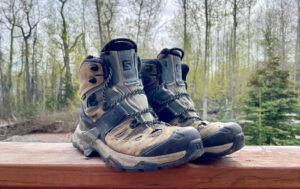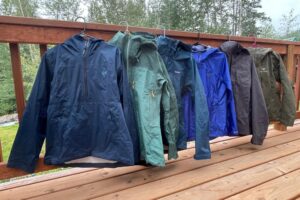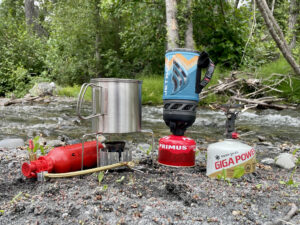When disaster strikes, you may only have minutes to prepare. Everyone should have an emergency survival kit and plan. Part of that plan should include being informed and able to communicate. An emergency radio is vital.
We’ve researched the best emergency radios for all sorts of scenarios. Whether you’re looking for the best battery-operated, hand-crank, or solar emergency radio, there’s something here for you.
The best emergency radio review
Most compact: RunningSnail Emergency Radio

- SOS button
- Hand crank
- Battery or solar power charging
- Flashlight
- AM/FM radio
Pros
- Compact
- Portable
- Easy-to-use crank
Cons
- Only one light
- Battery drains quickly
Sometimes good things really do come in small packages. Despite its size, the RunningSnail Emergency Radio impressed me with its capabilities and features.
The fold-out crank in the back is large considering the device’s size, making charging easy, and there are battery indicator lights. It could use a bit more power though; when charging my phone, it drained the battery fast.
The speakers are relatively clear, though a bit fuzzy when tuned to the weather radio station. When switching to FM radio, the speakers had no issues.
Additionally, the flashlight is exceptionally bright. My favorite feature of this device is the SOS button. When the button is held down, it plays a loud siren sound and flashes its lights. This feature could be incredibly useful during an emergency. Read the in-depth review here.
See RunningSnail Emergency Radio on Amazon
Best overall: Kaito KA500 Emergency Radio

- Three lights
- Solar panel
- AM/FM radio
- NOAA weather radio
- Carry handle
- Six power options
Pros
- Portable
- Crisp speakers
- Multiple power options
Cons
- Hand crank can be difficult to use
- Initial setup is tricky
This portable emergency radio has six power source options, including solar, hand crank, and AA batteries.
NOAA weather radio and a full range of AM and FM emergency radio stations keep you up to date with local and national weather. The speakers were pretty crisp and it was easy to hear. It includes a reading lamp and flashlight.
The hand crank was reasonably easy to operate but is relatively small compared to the device’s size. Read the in-depth review here.
See Kaito KA500 Emergency Radio on Amazon
See Kaito KA500 Emergency Radio on Walmart
Best water resistance: FosPower Emergency Radio

- AM/FM and NOAA radio
- Flashlight and reading light
- Powered via a hand crank
- Solar power, or batteries
Pros
- Lightweight
- Compact
- IPX3 Rating
Cons
- LED light under the solar panel cannot be turned off when the panel is lifted
If your area is prone to severe storms, hurricanes, or flooding, a NOAA emergency radio with a water-resistance rating is vital. The FosPower Emergency Radio has an IPX3 water-resistance rating; it will still function after being sprayed with water from an angle of 60° or less. While not 100% waterproof, it still provides more protection than most competitors.
The radio can act as a charging bank, features an LED flashlight and reading light, and has multiple charging options: solar power, a hand crank, and a battery pack. It also offers AM/FM radio and NOAA weather radio, so you can stay tuned into both regional and national alerts.
See FosPower Emergency Radio on Amazon
Biggest screen: Aiworth Emergency Radio

- Four charging options
- LCD screen
- AM/FM/WB radio
Pros
- Large LCD screen
- Bottle opener
- Mini-USB cable included
Cons
- Solar panel is not adjustable
The Aiworth Emergency Radio prominently features an LCD screen on the side. The screen displays information such as the emergency radio frequency, volume, and battery percentage. This NOAA emergency radio offers AM/FM stations and weather radio, so you stay informed. The extra-long telescoping antenna helps your device stays connected no matter where you are.
For device can be powered using a hand crank, solar power, a mini-USB cord, and AA batteries. Additional features include a reading lamp, flashlight, an SOS alarm, and a bottle opener.
See Aiworth Emergency Radio on Amazon
Most safety features: Midland ER310 Emergency Radio

- AM/FM/WB radio
- Dog whistle
- multiple charging options
- SOS feature
Pros
- Dog whistle
- SOS function
- AM/FM/WB radio
Cons
- No reading light
- Non-adjustable solar panel
When it comes to safety features, the Midland ER310 Emergency Radio can’t be beaten. Not only does this battery-powered am/FM radio feature the siren blaring SOS feature of other radios, but it also has a dog whistle for signaling rescue teams that may be using dogs to search for human life. If you live in an earthquake-prone area, this minor feature could make a big difference.
In addition to safety features, this radio boasts a 2600mAh rechargeable Li-ion battery, solar panel, hand crank, a flashlight, the ability to charge devices, and AM/FM/WB emergency radio. The only downsides are its lack of reading light and a non-adjustable solar panel.
See Midland ER310 Emergency Radio on Amazon
Most budget-friendly: FORTECLEAR Emergency Radio

- SOS alarm
- Flashlight and reading light
- Solar
- USB cord, or hand crank-powered
Pros
- Two lighting options
- Adjustable solar panel
- Weather alert mode
- SOS alarm
Cons
- Not compatible with batteries
The FORTECLEAR Emergency Radio is a budget-friendly option for AM, FM, and weather radio stations. You can also turn on the weather alerts function to immediately alert you if the National Weather Service is pushing out an emergency alert — even when your radio is not on.
Charging is easy with the hand crank, USB cable, and adjustable solar panel. There’s a reading light under the solar panel and a flashlight with three modes on the front of the device.
See FORTECLEAR Emergency Radio on Amazon
Best for camping: Eton Ultimate Camping Radio

- Large ambient light
- Bluetooth connectivity
- AM/FM/WB radio
Pros
- Large light
- Large hand crank
- Bluetooth connectivity
- Headphone jack
Cons
- Non-adjustable solar panel
- No additional safety features
While the Eton Ultimate Camping Radio does well in emergency settings, it shines as a camping radio. Many folks head to the great outdoors to get away from lights and technology, but others want a few creature comforts such as a light, speaker, radio, and more.
This radio features a sizeable ambient light on the back, with a flashlight and red blinking light on the handle. It features AM/FM/WB radio stations and Bluetooth connectivity. A charging port keeps your phone at full capacity, and a headphone jack ensures you don’t bug your camping neighbors. You can charge the device via the large hand crank on the front or the non-adjustable solar panel on the handle.
See Eton Ultimate Camping Radio on Amazon
Why trust us
Growing up on the Gulf Coast, I was in the thick of it. Tropical Storm Allison at age 7, Rita at 11, Ike at 14, Harvey at 23, and those are just the big ones. I learned, that when you need to hunker down, you better have an emergency kit, and it should always include a hand-crank emergency radio.
Who this is for
Emergency radios are a valuable tool for anyone who lives in disaster-prone areas. These tools are one of those items that you hope you won’t need but will be thankful you have when the time comes.
How we picked
I picked the product selection for this guide through my own experience living on the hurricane-prone gulf coast and by reading product reviews for dozens of radios.
How we tested
Testing for these radios involved my first impressions and time spent learning the products.

Features to look for in emergency radios
Channels and Alerts
Most radios can access both AM and FM channels as well as NOAA channels. While NOAA channels and the ability to receive critical weather alerts are crucial elements of an emergency radio, access to AM/FM radios is an excellent bonus for entertainment on camping trips.
Ability to receive signals from NOAA
Your emergency radio must be able to receive signals and alerts from NOAA. These alerts are essential in an emergency.
NOAA also gives regular weather reports for all 50 states. Should you be out of power, these signals can inform you of what’s happening around you.
Charging methods
The more charging methods, the better.
In many disaster scenarios, the power may be out, and charging exclusively via a cord is impractical. Solar power is a great option, but storm clouds, smoke, or ash could limit sunlight. Hand cranking is one of the best charging options because it does not rely on anything other than movement.
Battery life
Battery life can refer to many things when talking about emergency radios. It could be the length of time the device operates while running on batteries, or the amount of time the device functions after charging via solar or hand cranking.
The most sustainable way to keep a radio functioning is with hand cranking or solar power. Long battery life is ideal but with hand cranking and solar power usually readily available, it is not essential.
Extra features
Extra features can include sirens, flashlights, phone charging, and more. These features can come in handy to call for help.
Flashlights on your radio eliminate the need for additional devices.
Phone charging can be critical for keeping your phone working without power.
Durability and waterproofness
It should go without saying that if your radio is not durable, it’s not made for emergencies. Extreme weather can destroy homes and belongings and put those caught in their midst through the wringer.
Size and weight
If you have an emergency preparedness kit, which is an excellent idea whether you live in a disaster-prone area or not, your emergency radio should fit into your kit. A radio that is too large or bulky can’t move easily with you.
If your radio is not portable and needs to move locations during an emergency, your emergency radio is no longer helpful.
Price
Budgets vary and so do prices. Many emergency radios are under $100. An emergency radio is not a purchase you want to skimp on because it could potentially be lifesaving, but it should not break the bank either.
Ability to annoy dogs
It turns out that winding and cranking noises are a common agitator for dogs, but some are worse than others.
Is there a way to tell which one will anger your dog before you buy? Probably not, but you should know it’s a possibility.
Types of emergency radio
Weather alert radios
Some radios only have weather alerts through NOAA, although these are becoming less and less common. If purchasing a radio with weather alerts only, look for a radio with SAME, ensuring your radio only gets your local weather alerts and national alerts.
AM/FM radios
Most emergency radios on the market offer AM/FM radio stations and the NOAA weather station for critical alerts. AM/FM radio access allows better access to your local radio stations and warnings. Additionally, if you need to hunker down for a few days or more, those additional stations could provide entertainment.

Emergency radio FAQ
Q: Where can I buy an emergency radio?
You can purchase emergency radios via the links we’ve attached here. Alternatively, if you feel more inclined to buy in person, many home improvement and megastores carry at least one model of emergency radio.
Your best bet is to buy online, so you have a chance to research each one thoroughly.
Q: When will I need an emergency radio?
During severe weather events, a portable emergency radio can be a lifesaver. With climate change and weather-related disasters becoming more frequent, there’s never been a better time to pick one up.
Q: Why can’t I use my smartphone?
In short, because your smartphone will die. While we know it is hard to separate yourself from your smartphone, it may not work, depending on the emergency. Your phone is less durable and waterproof than a radio and has shorter battery life.
Q: What does an emergency radio do?
Emergency radios can receive transmissions and alerts from NOAA to keep you informed and often double as phone chargers, flashlights, and more.
Q: How do you use an emergency radio?
Before using your radio, you should ensure it is fully charged. Once your radio is charged, you can use the controls on the device to access the NOAA weather channels or your local radio station. Additionally, many radios can charge your phone via a USB cord and can act as a flashlight.
Q: How long does a crank radio last?
When fully charged, a crank radio will generally provide 10-15 hours of radio time. If you are using other features, that time frame will be shorter. The good news is that all you have to do to get the radio up and running again is crank it.
When it comes to the lifespan of a crank radio, there’s no firm answer but generally 500 to 1000 charges, so unless you have tornadoes ravaging your home weekly, we’re willing to bet you will get a few years out of your device, if not decades.
Q: What are the emergency radio channels?
Emergency radio channels usually vary by location. It is wise to find your local and state channels and write them on a note in your emergency preparedness kit.
Additionally, the national weather service (NOAA) has its own weather station. The NOAA station will deliver non-weather emergency updates too.






